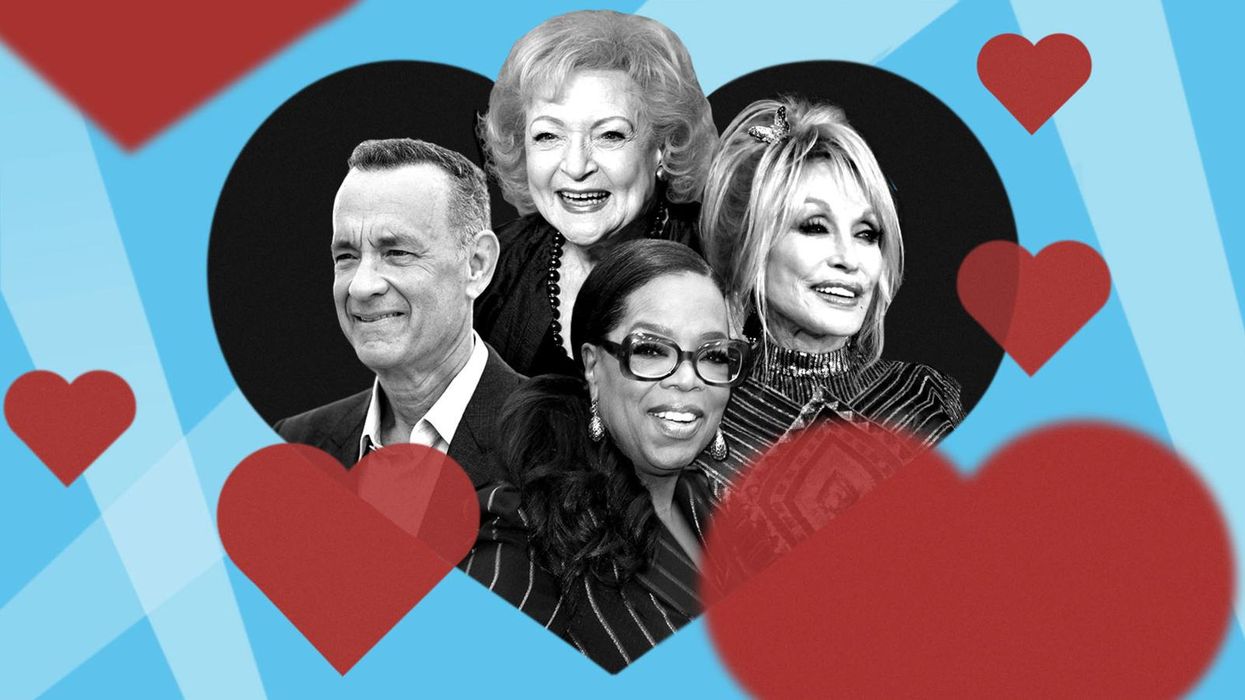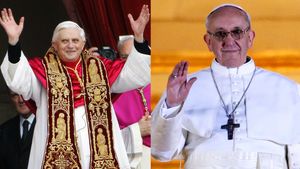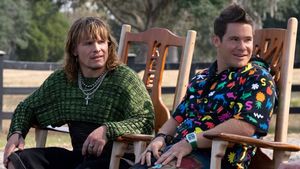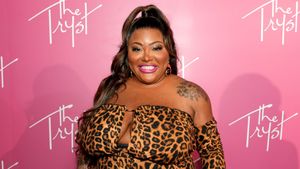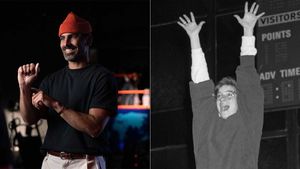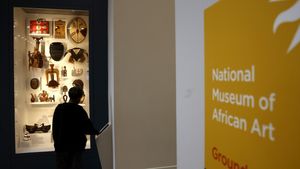(CNN) — In our increasingly divided world, there are few things on which we can agree -- not politics, not religion, certainly not social issues.
But there isDolly Parton.
The blonde icon with a bouffant is one of the few celebrities most Americans love unconditionally. She's made believers of conservatives and progressives, country fans and indie contrarians, boomers who grew up with her and "Zoomers" who've posed with murals of her face. She is a feminist heroine, an ally to the LGBTQ community, and a Southern girl from the Smokies whose story of success is a near-perfect example of the American dream come true. She helped fund Moderna's Covid-19 vaccine. Decades into her career, Dolly Parton is Teflon.
Parton is perhaps the most prominent example of an exceedingly rare category of celebrity — the American sweetheart. Over many years, sweetheart celebrities have cultivated reputations rooted in kindness, authenticity and hard-earned success that have elevated them above your average A-lister. They're the kind of celebrities who host an inauguration celebration to appease a hurting country. They inspire sympathy when they're photographed alone on a park bench eating a sandwich. And when they die, they prompt nationwide mourning, as though Americans just lost their own grandmother.
These "sweethearts" become symbols in American pop culture. We turn to them for inspiration, moral guidance, reliable entertainmen,t and even solace, said Claire Sisco King, an associate professor of communication studies at Vanderbilt University who studies celebrity culture.
"It's really difficult stuff that people experience every day — political divisiveness, concern about the future of the planet and the potential extinction of human life," Sisco King told CNN. "So the idea that someone who's famous could be really nice gives people a sense of hope."
Some of our biggest American sweethearts have been cultural fixtures for decades. Scholars of celebrity culture spoke to CNN about how certain celebrities rise above the rest of the Hollywood set to become the public's sweethearts and the meaningful relationships fans can form with these untouchable icons.
We want to identify with celebrities
It might seem glib to focus so much on celebrities when their wealth and status largely shields them from everyday challenges, but celebrity culture serves a more important function than we realize, Sisco Kind said.
Celebrities do "emotional labor" for their fans and haters alike, she said. They allow us to feel things through them — we might feel love and adoration for someone like Dolly Parton or the late Betty White, because they can represent kindness and humility, but deride more divisive figures like Kim Kardashian or Taylor Swift, who to some may represent narrow beauty norms or disingenuity.
We also want to identify with celebrities, she said. The tabloid US Weekly regularly features the section, "Stars — they're just like us!" — a collection of paparazzi shots of A-listers pumping gas, shopping for groceries, or dropping their kids off at school. Those kinds of images can reinforce the idea that celebrities are relatable, Sisco King said.
It makes sense that we'd want to identify with famous people whose reputations for niceness are equally well-known, said Jenna Drenten, an associate professor of marketing at Loyola University Chicago who studies how celebrities leverage social media.
"Often fans use a simple rule of thumb: does this person seem like someone I'd want to be friends with?" Drenten told CNN.
It certainly helps a celebrity build a "sweetheart" reputation when they became famous for playing sweethearts, like Tom Hanks: In between playing an irascible toy cowboy, he's portrayed a widower whose kindness attracts Meg Ryan, a Southern man who stumbles into historical events and compares life to sweets, a little boy who grew up too fast and Mr. Rogers. Because many of his best-known roles are of good-natured guys, we associate him off-screen with that same persona, Sisco King noted.
"We expect actors to show us authenticity and an earnest emotional experience," she said. "Because of that emphasis on authenticity, we tend to conflate actors and the characters they play."
Hanks is not Forrest Gump or Mr. Rogers, but he's clearly aware of his reputation, and he lives up to it on red carpets or in interviews, Sisco King noted. He performs the "nice guy" persona because fans expect it from him.
We love an underdog story
These sweethearts also, often indirectly, support the fantastical "American dream" — that any of us can become hugely successful through hard work, Sisco King said. Oprah endured several traumas in her youth, and racism and sexism in the TV industry, and she still earned her own daytime talk show and burnished her reputation as a genuine TV personality. Even after she became a billionaire, her many fans continue to uplift her as a rare gem.
Dolly Parton famously grew up in poverty in rural Tennessee. Keanu Reeves has experienced a number of personal tragedies that have endeared him to fans. All the strife in their lives only contributes to their legend.
"[Celebrities'] stories, coming from humble beginnings to achieving greatness, become a way of affirming people's faith in or hope that they can achieve similarly," Sisco King said.
Put simply, per Drenten: "Americans love an underdog story." And when those underdogs blossom into titans of their industry and seemingly hold onto their humanity, we often can't help but root for them.
Social media (and the pandemic) made celebrities more accessible
Our relationships to celebrities have become much more intimate in the last few years, particularly since the onset of the pandemic, Sisco King said. Our faves weren't working or doing press junkets, so they stayed in the public eye with intimate online snapshots from quarantine or cheeky cooking segments on Instagram Live. This was when it almost felt like celebrities really were like us. (That didn't last long once they started vacationing or escaping the virus in spacious, comfortable homes.)
Not to mention, Tom Hanks getting Covid-19 in March 2020 concretized the seriousness of the pandemic for many people — his was one of the first verified cases of the virus among major celebrities. It was shocking, at the time, that such an illness could penetrate a celebrity's bubble. He shared the news directly with fans on Instagram.
That the pandemic happened in an "era of ubiquitous digital networks" was a "perfect convergence," Sisco King said: We had easy access to famous people with whom we could develop parasocial relationships, or those one-sided relationships we have with celebrities we'll likely never know. When most-to-all interaction occurred virtually, it only deepened the strong feelings we have for certain celebs.
"We can get kind of obsessed with particular celebrities because they are easier to get access to," Sisco King said. "That kind of intensifies that kind of parasocial relationship."
There remains an expectation that celebrities should continue to provide access to fans. Some sweethearts are up to the task — Parton's team regularly posts on her behalf, sharing a mix of sponsored content, irresistible throwback photos and even memes. Hanks might even post personally if his "Hanx!" signatures are to be believed. Oprah shares candid videos about what she's cooking, where she's hiking and the shenanigans she's dragging Gayle King into.
On Twitter, TikTok, and other platforms, even brief anecdotes about celebrities can travel far and fast, which can help further boost the reputations of some sweethearts. Tales of stars doing basic acts of good, from Hanks delivering a platter of martinis to his table at the Golden Globes to Paul Rudd reaching out to a bullied fan, frequently go viral. It's even more impactful when a sweetheart celebrity doesn't divulge their good deed themselves — when Keanu Reeves' $31.5 million donation to cancer research was revealed by the press, it only deepened the belief that Reeves is a humble, genuinely good person.
Why Dolly Parton is the queen of sweethearts
Even among American sweethearts, Parton is a "special case," Sisco King said.
"Part of what has made her so beloved is that she's adored by people of so many different walks of life," Sisco King said. "She can mean so many different things to so many different people."
Parton has been upheld as a feminist icon who has overcome sexism and objectification to rise to the top of her industry, which can endear her to people marginalized by race, gender, or sexuality. She's a talented lyricist whose songs still move listeners decades later. She is who we want her to be, Sisco King said.
The ever-savvy Parton has capitalized on this prolonged, social media-aided wave of stardom. In the last five years alone, she's slapped her name onto a Netflix series inspired by her lyrics, an NBC Christmas special, Duncan Hines cake mix, a Williams-Sonoma collection, a T-Mobile Super Bowl commercial and a live New Year's Eve show (the last two in collaboration her goddaughter Miley Cyrus). Then there are the third parties who sell prayer candles emblazoned with her face, cross stitch patterns with her lyrics, wrapping paper with her image or car air fresheners shaped like her wigged head. The brand Lingua Franca sells nearly $400 cashmere sweaters embroidered with "What would Dolly do?" and "In Dolly we trust."
And yet, for the most part, fans haven't grown cynical of Parton and her marketing prowess. When a celebrity we love does something we don't love -- Tom Hanks cursing at paparazzi and fans swarming his wife, maybe, or Parton lending her likeness to products we dislike — we can "suspend disbelief" in a way to "compartmentalize those concerns when you're really deeply invested in a celebrity," Sisco King said.
Parton has also accumulated "goodwill capital," said Gayle Stever, a professor of psychology for Empire State College, State University of New York who studies fandom. "Her generosity and philanthropy are well-known, and people appreciate that." Even if she makes a move we wouldn't, we're able to disregard it, because we think we know her well enough.
American sweethearts can inspire us to do good
Celebrity sweethearts like Parton and Hanks can feel just as important to us as our real-life loved ones, Sisco King noted. We feel connected to the ones we think we know well, even if the love isn't reciprocated.
When the biggest celebrities of the day include a billionaire tech exec with slippery Twitter fingers and a formerly lauded rapper who uses racist and antisemitic language, it can be something of a comfort when an affable figure like Paul Rudd or Keanu Reeves appears onscreen.
Engaging with beloved celebrities can also bring about more good than video tributes and merch with a famous person's face. Stever said that often, adult fans of sweetheart celebs are motivated to join them in the causes their idols care about. It matters when Parton draws attention to children's literacy or Oprah highlights antiracist efforts, or when Betty White publicized animal advocacy, because they may prompt their fans to get involved.
"Those kinds of role models encourage people to be philanthropic and to care about others," Stever said. "I think this serves a huge cultural purpose ... all of these people have accumulated a huge amount of positive social capital that inspires their fans to support the good works that these admired celebrities support. We need that."
On a personal level, engaging with beloved celebrity sweethearts "allows us to process our own feelings," Sisco King said. By viewing their work or supporting them, we can feel those emotions that we might otherwise bury.
"It's the same reason we seek out films and television shows that produce emotional experiences — 'I want to have a good cry,'" she said. "I think celebrity culture functions kind of similarly."
The-CNN-Wire
™ & © 2023 Cable News Network, Inc., a Warner Bros. Discovery Company. All rights reserved.
